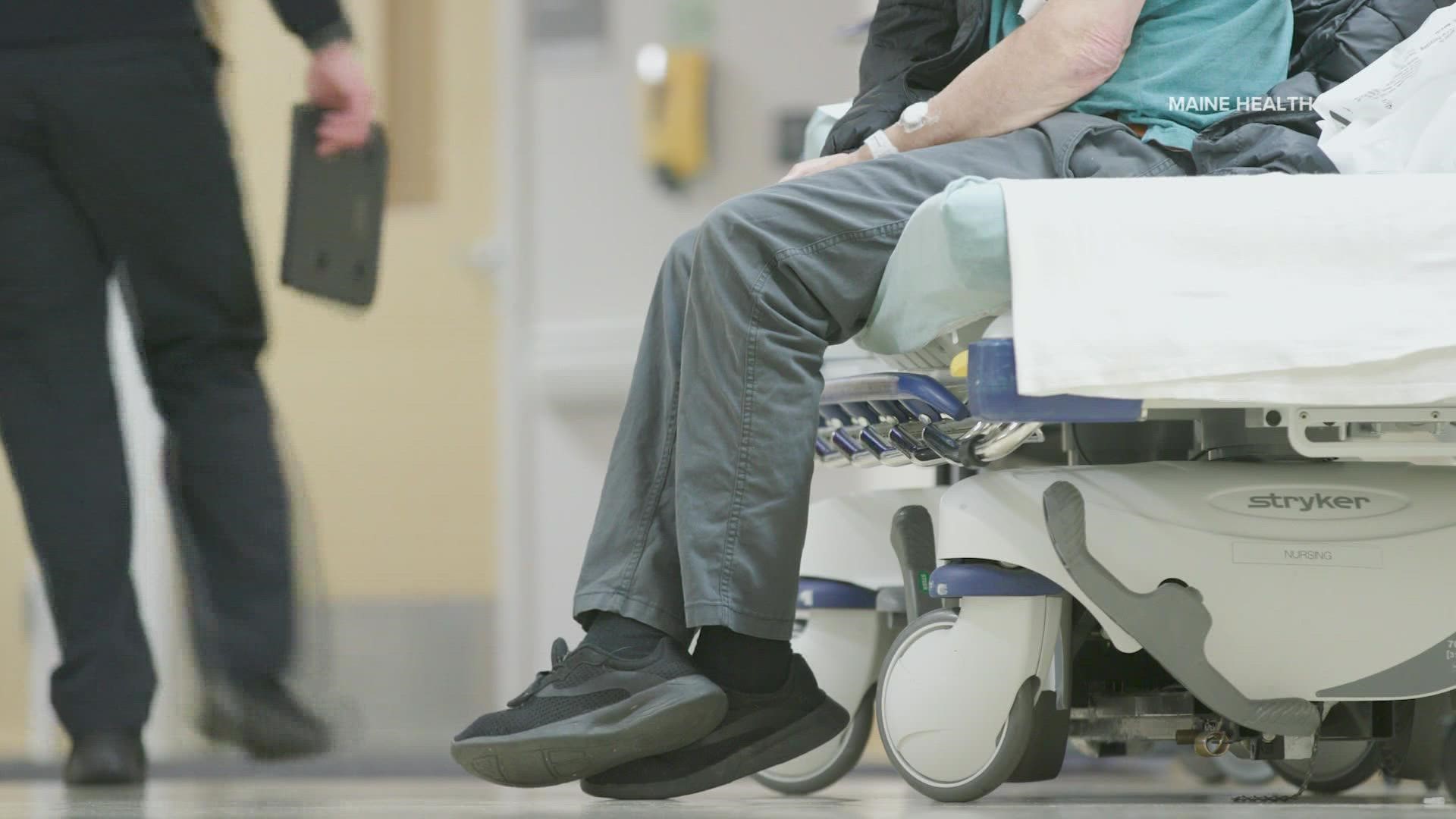MAINE, USA — U.S. Surgeon General Vivek H. Murthy is sounding the alarm on the mental health crisis confronting our kids. The surgeon general said the national average of weekly emergency room visits for suspected suicide attempts among teens jumped nearly 40% in February and March of this year compared to the same months in 2019.
Even before the pandemic, rates of depression, anxiety, and other mental health problems among kids in Maine were on the rise. Now calls are growing louder for swift action to keep the most vulnerable kids from falling through the cracks in a system under even more stress.
"Every day at MaineHealth, one-third to half of our emergency beds are filled with behavioral health patients. That's a real challenge," Katie Harris, the government affairs officer for MaineHealth, said.
The state's largest health care system oversees 10 hospital emergency departments. The growing demand for mental health care amid a severe shortage of trained professionals is overwhelming due to already limited services and is creating bottlenecks.
"We are seeing patients getting stuck," Harris said.
Already on the rise before the pandemic began, the U.S. Centers for Disease Control and Prevention said symptoms of depression and anxiety have doubled during COVID, including a 25% spike among kids and teens.
Because of Maine's chronic shortage of pediatric mental health beds and services for kids who experience a mental health crisis, the only immediate option is the local emergency room. It's a landing place where staff is often not trained or equipped to deal with severe mental health needs patients. One parent said being in the ER was more than overwhelming for her son.
"It was terrifying and traumatic for him. He was hearing these adults who were under the influence of drugs and alcohol," she said.
We are not revealing this mom's identity to protect her son. The 8th grader has bipolar disorder and is on the autism spectrum. Between the ages of 7 and 13, he spent more than 100 days waiting in emergency rooms during serious mental health episodes.
Earlier this year, while living at a residential facility in Skowhegan, he ended up in the ER at Redington-Fairview General Hospital for nearly a month, waiting for a pediatric bed. She said discharging him was not an option.
"I am not going to allow him to come home and kill himself," his mom said.
Every time her son got stuck in the ER, a state crisis team tried to find a bed in one of four hospitals in Maine that provide psychiatric treatment for kids 18 and younger. With only 110 to 120 pediatric mental health beds in the entire state, these facilities grapple with growing waiting lists of kids in crisis. When he could get a placement, her son would improve enough to come home until the next crisis cycled the middle schooler back into the emergency room.
"These kids are being forgotten in the ER. They are there wasting away and deteriorating," she said.
Finding solutions to fix what many call a broken mental health care system was the focus of a recent mental health summit.
Diane Boufard has two children in the adult behavioral system. She oversees a network helping to support parents of children with mental health issues.
"This is the first time I don't feel I can give families hope because no services are available," Boufard said.
"That wait time is their lifetime because they are at such an acute state because they don't have support," Hanna Longley with NAMI Maine said.
The nonprofit organization is dedicated to building better lives for the one in four Mainers affected by mental illness.
Many kids and teens are languishing on waitlists for residential treatment programs. These are programs that can't retain staff who are leaving for higher-paying jobs outside of health care. Bobby Martin is an advocate with Disability Rights Maine, the state's advocacy and protection agency for people with disabilities.
They are constantly dealing with a high turnover of staff because the staff doesn't want to do jobs that don't pay a living wage.
Rep. Lori Gramlich, D-Old Orchard Beach, is a licensed social worker. She sponsored a bill that is expected to be taken up by the Legislature's Appropriations Committee in January. LD 496, would increase the MaineCare reimbursement rate by 25% for prevention-based community programs, which would be a much-needed boost to recruiting staff to provide mental health services kids can access while living at home.
"We cannot get workers to work in these facilities because providers have not seen an increase in their rates in decades," Gramlich said.
Maine Department of Health and Human Services spokesperson Jackie Farwell told NEWS CENTER Maine, "The COVID pandemic and related circumstances have continued to present unprecedented challenges to all areas of the children's behavioral health care system, as with the health care system as a whole. Providers have reported challenges with hiring and recruitment of staff."
Read DHHS' full statement below, or click here.
Meanwhile, some lawmakers say the system needs to be rebuilt from the ground up. That process could take years of coordination and resources.
Sen. Cathy Breen, D-Falmouth, is the Maine Senate chairwoman of the Legislature's Appropriations Committee. She is also the mom of a daughter in the adult behavioral health care system.
"We need all hands on deck, and we need to be very creative," Breen said.
Maine DHHS also issued this statement to NEWS CENTER Maine:
"The Maine CDC also gathers information from sources such as the Pregnancy Risk Assessment Monitoring System, which tracks self-reported rates of behaviors (e.g., substance use) among mothers who have recently given birth. PRAMS asks questions regarding mothers' alcohol habits during, as well as just prior to pregnancy. In addition, the Maine CDC tracks rates of substance use among women of childbearing age (15-44) through self-reported data sets such as the Behavioral Risk Factor Surveillance System and the National Survey on Drug Use and Health."
More NEWS CENTER Maine stories.

